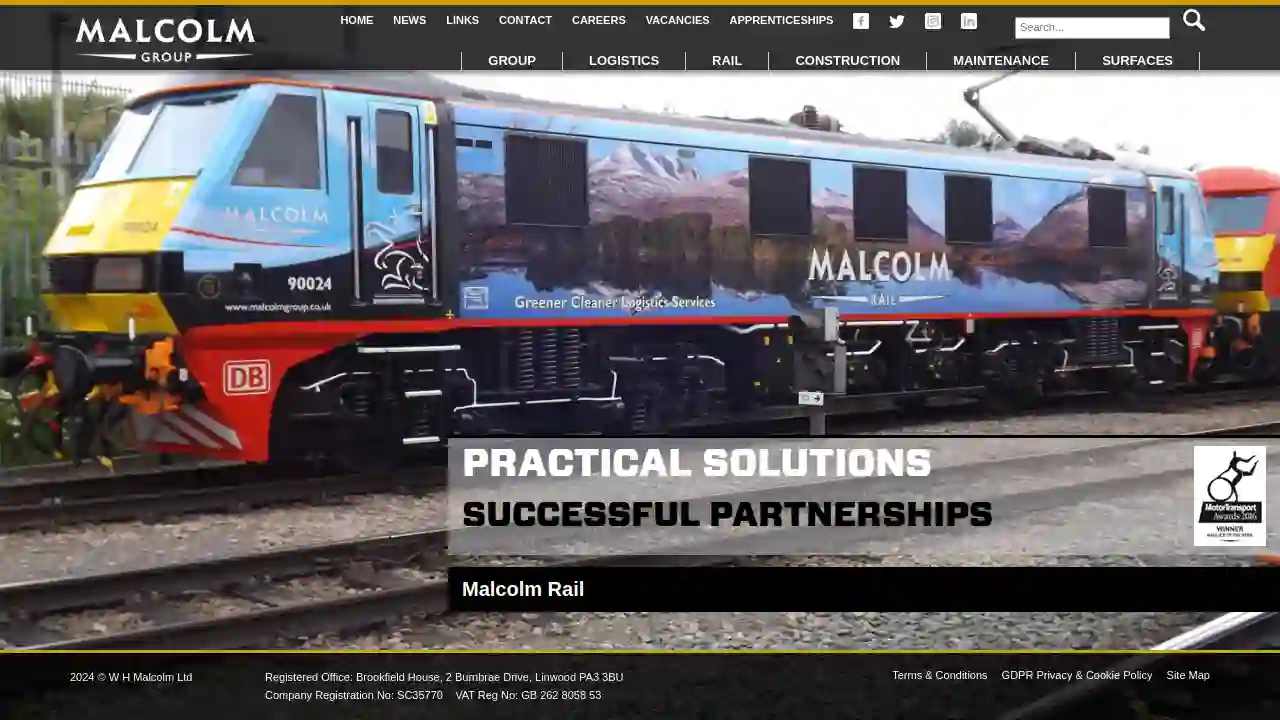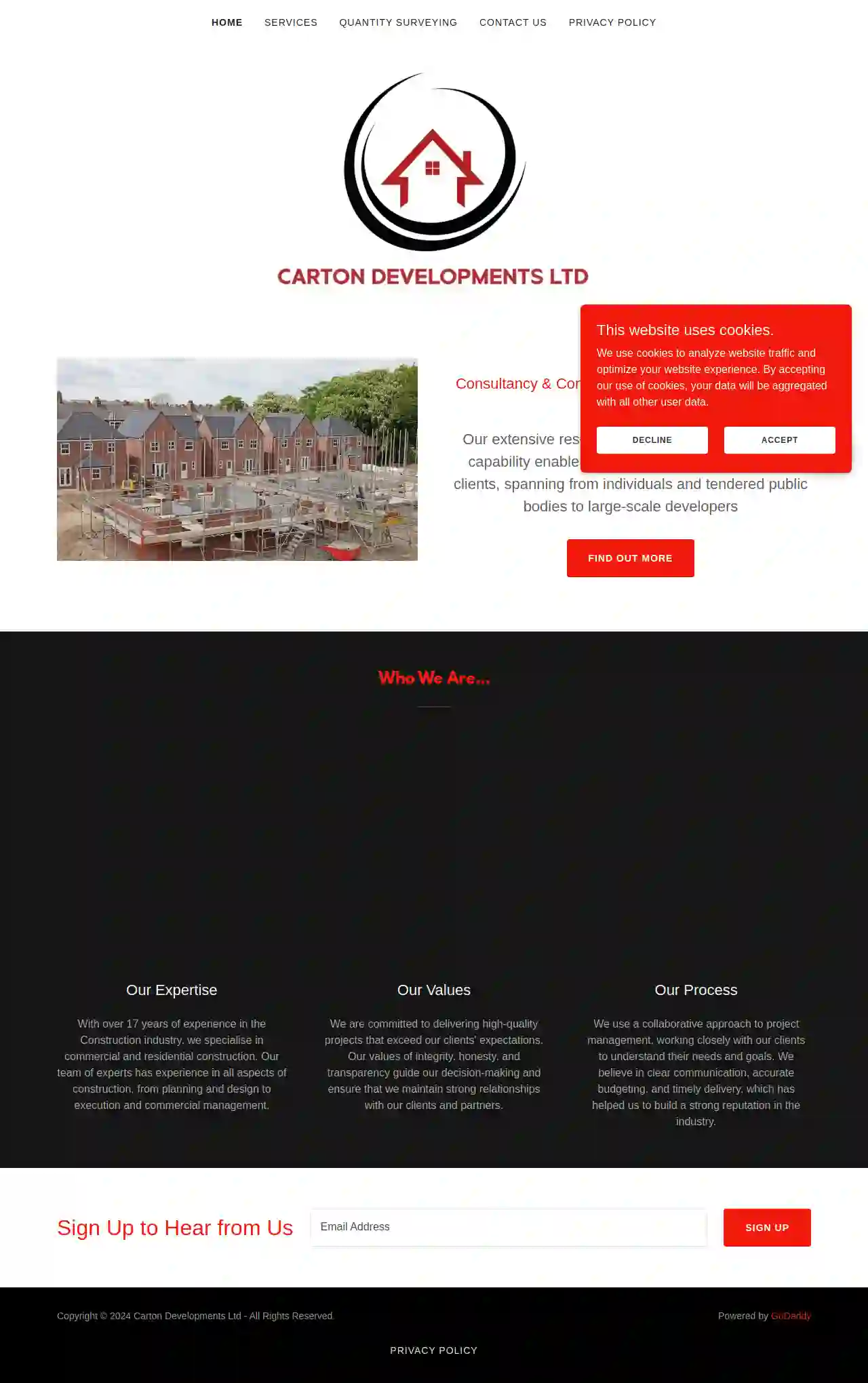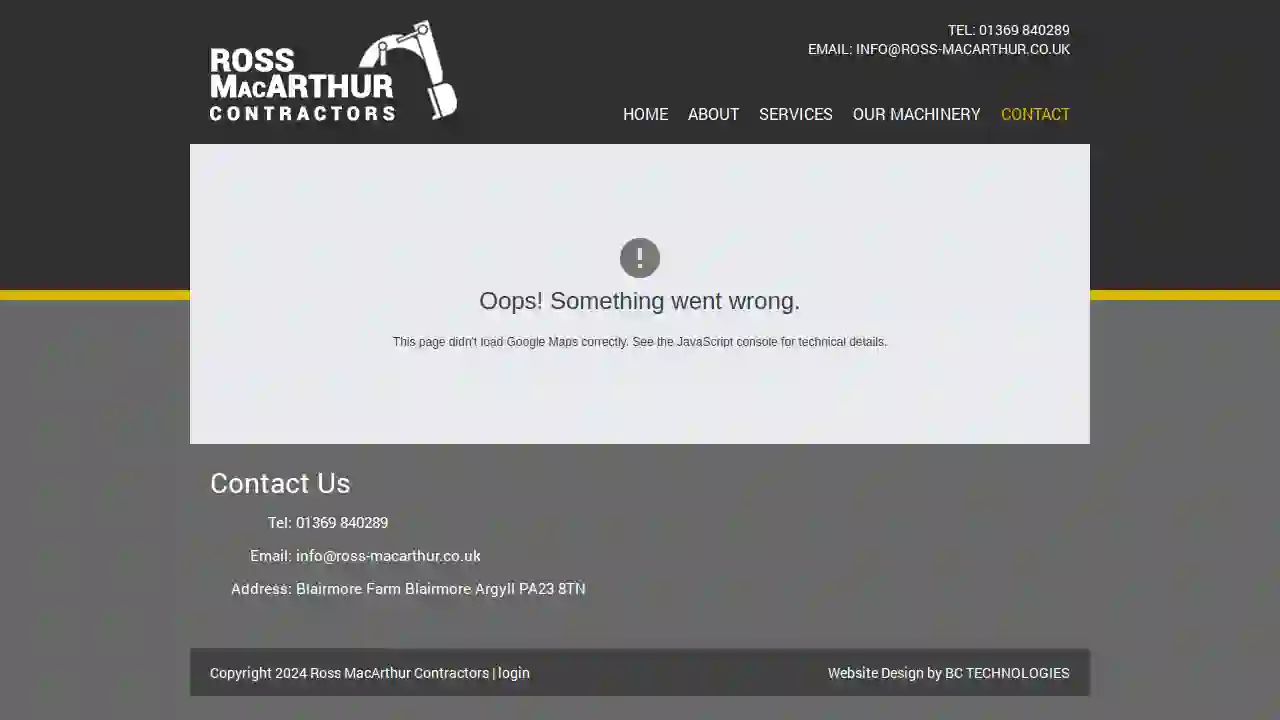Demolition Contractors Port Glasgow
Best Demolition Companies in Port Glasgow
Receive multiple Demolition Companies quotes for your project today! Compare profiles, reviews, accreditations, portfolio, etc... and choose the best offer.

Drain Fix Solutions
4.961 reviewsGlasgow, GBAbout Us We are a locally owned business covering Glasgow and the West with over 8 years experience in the drainage industry. All our staff are fully trained and qualified so you know you are in the best hands when it comes to your drainage issues. We have probably dealt with every drainage problem imaginable so there’s not an issue too small or big. Our phone lines are operational 24/7 so you can call us anytime to book in your appointment. We specialise in all aspects of Domestic and Commercial Drainage issues and aim to carry out the works as quickly and efficiently as possible meaning less disruption for our customers. We offer a mix of fixed pricing and job rates for our services and all works are explained to you prior to commencement to ensure you are aware of what the job entails and the cost before starting. Please click on one of our services to find out more.
- Services
- Why Us?
- Testimonials
- Gallery
Get Quote
Malcolm Construction
441 reviewsBrookfield House, 2 Burnbrae Drive, Linwood, PA3 3BU, GBThe Malcolm Group The Malcolm Group is a leading provider of practical solutions to businesses throughout the UK. We offer a wide range of services, including logistics, rail, construction, maintenance, and surfaces. We are committed to providing our customers with the highest quality of service and value for money. Our History The Malcolm Group has a long and proud history, dating back to 1934. We have grown from a small family business into a major player in the UK economy. We are committed to investing in our people and our infrastructure to ensure that we can continue to provide our customers with the best possible service. Our Values Our values are at the heart of everything we do. We are committed to: Providing our customers with the highest quality of service Investing in our people and our infrastructure Being a responsible and sustainable business Building strong relationships with our customers and suppliers
- Services
- Why Us?
- Gallery
Get Quote
Metro Rod (Glasgow)
3.915 reviewsGlasgow, GBMetro Rod Scotland: Your Trusted Drainage Experts Metro Rod Scotland is your one-stop shop for all your drainage needs across the beautiful country of Scotland. From simple drain unblocking to complex pump maintenance, our team of local drainage engineers is here to help you 24/7/365. We understand the importance of a reliable and efficient drainage system, whether it's for your home or business. That's why we pride ourselves on providing a professional service from start to finish, ensuring minimal disruption to your daily life. Our team is equipped with the latest technology and expertise to handle any drainage challenge, no matter how big or small. We offer a wide range of services, including: • CCTV drain surveys • Drain mapping • Drain repairs • Drain unblocking • Gutter clearance • Pipelining & renovation • Pre-planned maintenance • Pump maintenance and repairs • Robotic cutting • Saniflow repair and replacement • Septic tank emptying • Tanker services including high-pressure water jetting, flood water extraction, and grease trap emptying We are committed to providing a fast, professional, and complete drainage service that minimizes disruption to your business and home. Our unrivalled response time and first-time fix rate mean you can rely on us to get the job done right, the first time. Whether you're in Edinburgh, Glasgow, Aberdeen, the Scottish Highlands and Islands, or anywhere in between, Metro Rod Scotland is your trusted partner for all your drainage needs.
- Services
- Why Us?
- Gallery
Get Quote
LD Home Improvements
Glasgow, GBAt LD Home Improvements, we pride ourselves on being Glasgow's premier choice for comprehensive home renovation and improvement services. With a passion for transforming spaces and a commitment to excellence, we offer a wide range of services designed to meet all your home improvement needs. Based in the heart of Glasgow, LD Home Improvements is a team of skilled professionals dedicated to delivering high-quality workmanship and exceptional customer service. Our expertise spans multiple areas of home improvement, ensuring that we can handle any project, big or small, with precision and care. Our Values Quality Workmanship: Delivering high standards in every project we undertake. Customer Satisfaction: Ensuring our clients are happy with our services through open communication and personalized solutions. Competitive Pricing: Offering transparent and fair pricing to provide excellent value for your investment.
- Services
- Why Us?
- Gallery
Get Quote
Carton Developments Ltd
Glasgow, GBConsultancy & Contracting based on Experience and Prudence Our extensive resources, wealth of experience, and capability enable us to cater to a diverse range of clients, spanning from individuals and tendered public bodies to large-scale developers. Find Out More Who We Are... With over 17 years of experience in the Construction industry, we specialise in commercial and residential construction. Our team of experts has experience in all aspects of construction, from planning and design to execution and commercial management. Our Values We are committed to delivering high-quality projects that exceed our clients' expectations. Our values of integrity, honesty, and transparency guide our decision-making and ensure that we maintain strong relationships with our clients and partners. Our Process We use a collaborative approach to project management, working closely with our clients to understand their needs and goals. We believe in clear communication, accurate budgeting, and timely delivery, which has helped us to build a strong reputation in the industry.
- Services
- Why Us?
- Gallery
Get Quote
University of Glasgow
4.7Glasgow, GBContact the University of Glasgow For all enquiries regarding applications, admissions and studying at Glasgow please email the relevant address from the lists below: Undergraduate enquiries Accountancy, Arts, Engineering, Nursing, Sciences, Social Sciences Postgraduate enquiries For all postgraduate enquiries, please use the online form. Short course enquiries For all short course enquiries, please email [email protected] . Request a prospectus To request a prospectus, and for details of our undergraduate and postgraduate programmes, please see our Prospectuses page. Ask a Student To ask a current student a question, please see our Ask a Student page. International students We have a diverse University community with students and staff from over 140 different countries. Find out more at our International students page. Mature students UCAS provides useful tailored information about university study: UCAS: Mature students The Centre for Short Courses The Centre for Short Courses runs a range of day time and evening part-time courses, including Access to Higher Education. You can contact them at [email protected] . Switchboard Contact our main University switchboard: +44(0)141 330 2000 Emergency contacts Emergency and 24/7 Student crisis contacts British Sign Language BSL users can contact us via contactSCOTLAND-BSL, the on-line British Sign Language interpreting video relay service. Find out more about BSL assistance: contactSCOTLAND Media enquiries Assistance for journalists is available: [email protected] Filming enquiries News and current affairs programme makers should contact Media Relations on +44 (0) 141 330 3535 . Drama, entertainment and others should contact Conference and Visitor Services on +44 (0) 141 330 3110 . Jobs at Glasgow Current vacancies: [email protected] Employee partnerships and student placements Our careers service helps to make the links between students, graduates and employers easy and rewarding. Looking to recruit some of Glasgow's freshest talents? Want some advice on what career path you should follow? Please visit our Careers Service page.
- Services
- Why Us?
- Gallery
Get Quote
EA Construction Scotland Ltd
North Letham Farm, Letham, FK2 8QU, GBEA Construction: Your Trusted Groundwork and Civil Engineering Partner in Scotland EA Construction Scotland Ltd has established a strong reputation for delivering professional and efficient groundwork and civil engineering services. We are committed to providing exceptional quality and exceeding client expectations on every project, big or small. Our team of highly skilled professionals possesses extensive experience in a wide range of projects, including housing infrastructure, roads & sewers, land drainage, hard and soft landscaping, earthworks, and minor civil engineering. Since 2009, we have consistently provided engineering and utility services to a diverse clientele across Scotland, encompassing both private and public sectors. Our extensive project portfolio reflects our dedication to delivering all contracts safely, on schedule, and within budget, while ensuring value for money. We are committed to developing long-term business relationships and strive for repeat business by offering added value through innovative engineering excellence and exceptional service quality. Our commitment to sustainability is evident in our dedication to safeguarding all stakeholders, including the health and safety of our employees, the environment, and society as a whole.
- Services
- Why Us?
- Testimonials
- Gallery
Get Quote
Ross Macarthur Contractor Ltd
53 reviewsBlairmore Farm, Blairmore Argyll, Blairmore Farm Blairmore Argyll, Dunoon, PA23 8TN, GBAbout Ross MacArthur Contractors Ross MacArthur Contractors is a building and general contracting business based near Dunoon, in Argyll, Scotland. We undertake a mixed portfolio of civil works in the public and private sectors, from individual clients seeking to build or improve their own property right up to large-scale organisations that require support for their construction projects. Our History Ross MacArthur set up in business in 2003 as a sole trader. He hired out plant and equipment and undertook small agricultural contracting jobs himself, all from his base at Blairmore Farm. The business grew steadily, as, through word of mouth, Ross built a reputation for quality contracting work and hassle-free plant-hire. He soon branched out into construction work and gradually assembled a team of skilled plant operators and manual labourers, able to tackle jobs as diverse as sea wall protection, cable and pipe laying, road repairs and emergency remedial work for the energy industry. Our Growth By 2013 the business had grown to such an extent that the decision was made to create a limited company, Ross MacArthur Contractors Limited, which is solely owned by Ross himself. A separate but associated company, Ross MacArthur Plant Hire Limited, was created at the same time. Our Services Ross MacArthur Contractor Ltd has a fleet of around 15 machines available for hire on a short- or medium/longer-term basis, capable of tackling a wide range of specialist and general contracting duties. These vehicles can be supplied with fully certified, skilled operators who are adept at working in the often difficult terrain and frequently challenging weather conditions, which are characteristic of the Argyll and Bute region. Our Commitment We pride ourselves on providing a friendly, professional, customer-focussed service. So if you’re looking for plant or machinery hire or help with a building or contracting job, we would love to hear from you. We are more than happy to answer any queries or to discuss your project.
- Services
- Why Us?
- Gallery
Get Quote
Affordable Drainage Solutions (Drain Unblocking / Cleaning)
584 reviews134 Clark Drive, Irvine, KA12 0NU, GBAbout Us Affordable Drainage Solutions is an independent company based on the West Coast of Scotland, we are passionate about solving drainage problems Blocked Drians Repairs etc and providing great customer experiences. ADS is run by Kevin Muir, the man behind ADS. Kevin looks forward to solving your drainage problems. Why choose Affordable Drainage Solutions? We have an expert team with over 25+ years of experience, we provide a professional Drain Unblocking, Blocked Drain Cleaning service at a competitive price. Contact us for a quote. Do you cover drainage emergencies? Our drainage engineers are available 24/7, 365 days a year. Be it a blocked drain,Cctv Surveys, domestic drain cleaning, cistern flooding etc. We are ready to take the stress out of your emergency. What locations does Affordable Drainage Solutions cover? We operate solutions to all drainage problems through Ayrshire, Renfrewshire, Glasgow South Side. Affordable Drainage Solutions Ayrshire locations (North Ayrshire, South Ayrshire & East Ayrshire)Including Irvine, kilwinning, Ardrossan, Saltcoats, Stevenston, West Kilbride, Ayr, Prestwick, Troon, Mauchline Cumnock, Kilmarnock,Stewarton,Kilbirnie,Dalry,Beith,Fairlie; Largs, Kilwinning and more. Affordable Drainage Solutions Renfrewshire LocationsJohnstone, Paisley, Bridge of Weir, Linwood, Bishopton,Kilmacolm,Howwood and more. Affordable Drainage Solutions Glasgow Southside LocationsPollockshaws, Giffnock, Newton Mearns, Dumbreck, Clarkston, Darnley and more.
- Services
- Why Us?
- Our Team
- Gallery
Get Quote
KLR Rail & Construction Services Ltd
1 Portland Place, Heatherhouse Industrial Estate, Irvine, KA12 8LW, GBKLR Rail & Construction We are a specialised railway, construction and utilities subcontractor based in Ayrshire. Our capabilities are in fencing, infrastructure works, structural repairs, rope access services and vegetation services. Over 10 years of valued working relationships. We have a highly skilled and experienced work force on hand who are always available to assist with any Rail or Construction project that may arise. Our business has built long-standing relationships with clients and suppliers over the years, they are based on trust and continuous improvement. We are committed to providing a professional service from start to finish for all projects, there is no job too big or too small for the KLR team.
- Services
- Why Us?
- Testimonials
- Gallery
Get Quote
Over 13,059+ Excavation Contractors in our network
Our excavation experts operate in Port Glasgow & beyond!
ExcavationHQ has curated and vetted Top Excavation Pros in Port Glasgow. Find a top & reliable business today.
Frequently Asked Questions About Demolition Contractors
- Project Assessment: The demolition contractor evaluates the structure, site conditions, and project requirements.
- Permitting: Obtain necessary demolition permits from local authorities.
- Site Preparation: Secure the site, disconnect utilities, and remove any valuable or reusable items.
- Hazardous Material Abatement: Professionally remove asbestos, lead paint, or other hazardous materials if present.
- Demolition: Execute the chosen demolition method, bringing down the structure safely and efficiently.
- Debris Removal and Site Cleanup: Sort, process, and dispose of demolition debris responsibly. Clean up the site to prepare it for future use.
- Experience: Look for companies with a proven track record and years of experience in the demolition industry.
- Licensing and Insurance: Ensure the contractor is properly licensed to operate in your area and carries adequate insurance to protect you from liability.
- Safety Record: Inquire about their safety protocols and accident history. A reputable contractor prioritizes safety.
- References and Reviews: Ask for references from past clients and check online reviews to gauge their reputation and customer satisfaction.
- Professionalism: Choose a company that communicates clearly, provides detailed estimates, and has a courteous and responsive team.
- Site Security: Secure the demolition site with fencing and warning signs to prevent unauthorized access.
- Personal Protective Equipment (PPE): Workers should wear appropriate PPE, including hard hats, safety glasses, gloves, and steel-toe boots.
- Hazardous Material Removal: Properly identify and remove asbestos, lead paint, or other hazardous materials before demolition begins.
- Utility Disconnections: Disconnect all utilities, such as electricity, gas, and water, before demolition.
- Controlled Demolition Techniques: Employ controlled demolition methods to minimize risks and ensure the structure comes down safely.
- Dust Control: Implement dust suppression measures, such as water spraying or misting, to reduce airborne particles and protect air quality.
- Emergency Planning: Have an emergency plan in place, including communication protocols and evacuation procedures, in case of unforeseen events.
What are the steps involved in a typical demolition process?
How do I find a reputable demolition contractor?
How can I tell if my building contains asbestos?
What are the safety precautions for demolition?
What are the steps involved in a typical demolition process?
- Project Assessment: The demolition contractor evaluates the structure, site conditions, and project requirements.
- Permitting: Obtain necessary demolition permits from local authorities.
- Site Preparation: Secure the site, disconnect utilities, and remove any valuable or reusable items.
- Hazardous Material Abatement: Professionally remove asbestos, lead paint, or other hazardous materials if present.
- Demolition: Execute the chosen demolition method, bringing down the structure safely and efficiently.
- Debris Removal and Site Cleanup: Sort, process, and dispose of demolition debris responsibly. Clean up the site to prepare it for future use.
How do I find a reputable demolition contractor?
- Experience: Look for companies with a proven track record and years of experience in the demolition industry.
- Licensing and Insurance: Ensure the contractor is properly licensed to operate in your area and carries adequate insurance to protect you from liability.
- Safety Record: Inquire about their safety protocols and accident history. A reputable contractor prioritizes safety.
- References and Reviews: Ask for references from past clients and check online reviews to gauge their reputation and customer satisfaction.
- Professionalism: Choose a company that communicates clearly, provides detailed estimates, and has a courteous and responsive team.
How can I tell if my building contains asbestos?
What are the safety precautions for demolition?
- Site Security: Secure the demolition site with fencing and warning signs to prevent unauthorized access.
- Personal Protective Equipment (PPE): Workers should wear appropriate PPE, including hard hats, safety glasses, gloves, and steel-toe boots.
- Hazardous Material Removal: Properly identify and remove asbestos, lead paint, or other hazardous materials before demolition begins.
- Utility Disconnections: Disconnect all utilities, such as electricity, gas, and water, before demolition.
- Controlled Demolition Techniques: Employ controlled demolition methods to minimize risks and ensure the structure comes down safely.
- Dust Control: Implement dust suppression measures, such as water spraying or misting, to reduce airborne particles and protect air quality.
- Emergency Planning: Have an emergency plan in place, including communication protocols and evacuation procedures, in case of unforeseen events.